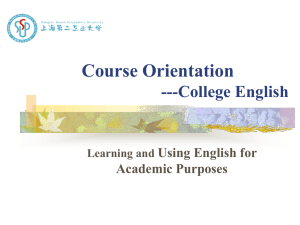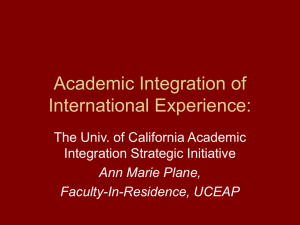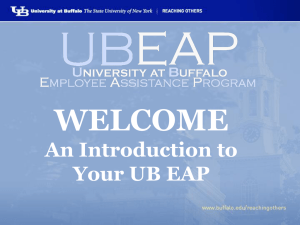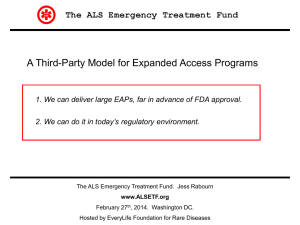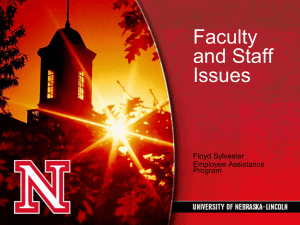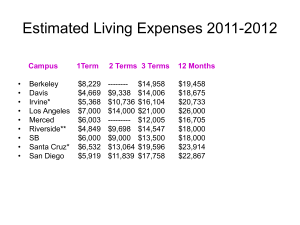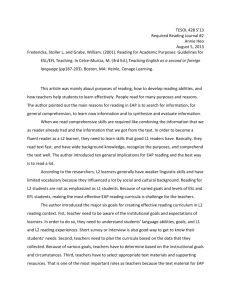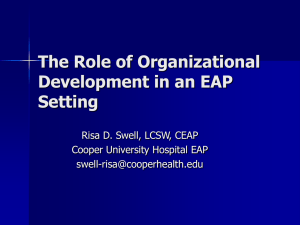(Education Abroad Program) risk framework Draft DOCX
advertisement
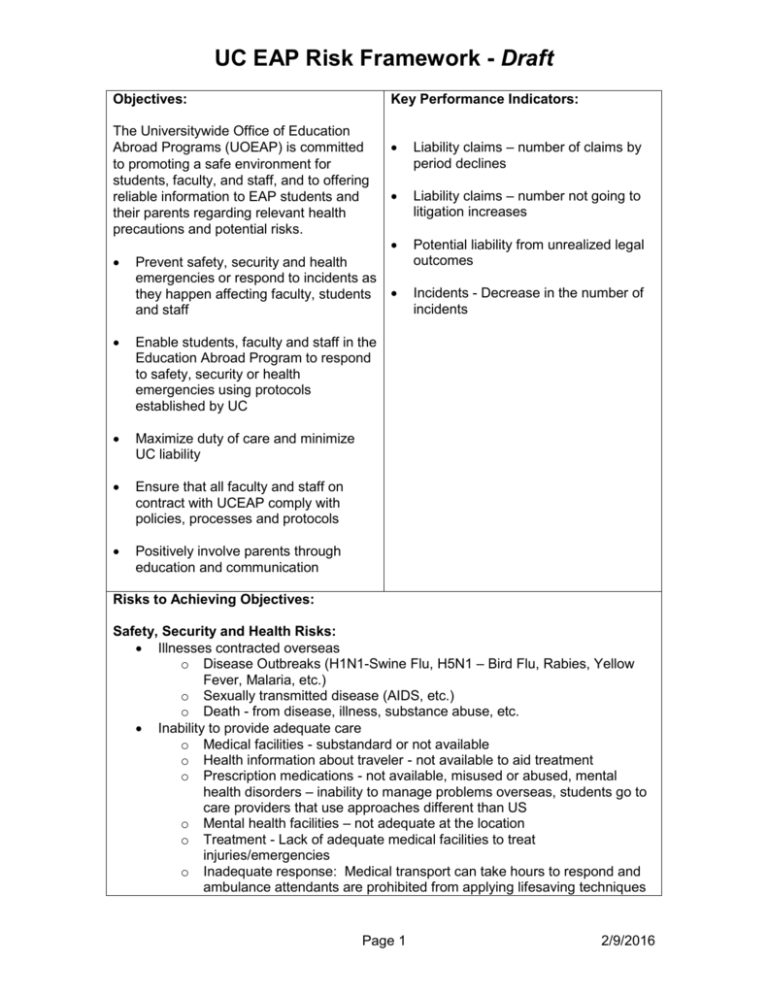
UC EAP Risk Framework - Draft Objectives: Key Performance Indicators: The Universitywide Office of Education Abroad Programs (UOEAP) is committed to promoting a safe environment for students, faculty, and staff, and to offering reliable information to EAP students and their parents regarding relevant health precautions and potential risks. Prevent safety, security and health emergencies or respond to incidents as they happen affecting faculty, students and staff Enable students, faculty and staff in the Education Abroad Program to respond to safety, security or health emergencies using protocols established by UC Maximize duty of care and minimize UC liability Ensure that all faculty and staff on contract with UCEAP comply with policies, processes and protocols Positively involve parents through education and communication Liability claims – number of claims by period declines Liability claims – number not going to litigation increases Potential liability from unrealized legal outcomes Incidents - Decrease in the number of incidents Risks to Achieving Objectives: Safety, Security and Health Risks: Illnesses contracted overseas o Disease Outbreaks (H1N1-Swine Flu, H5N1 – Bird Flu, Rabies, Yellow Fever, Malaria, etc.) o Sexually transmitted disease (AIDS, etc.) o Death - from disease, illness, substance abuse, etc. Inability to provide adequate care o Medical facilities - substandard or not available o Health information about traveler - not available to aid treatment o Prescription medications - not available, misused or abused, mental health disorders – inability to manage problems overseas, students go to care providers that use approaches different than US o Mental health facilities – not adequate at the location o Treatment - Lack of adequate medical facilities to treat injuries/emergencies o Inadequate response: Medical transport can take hours to respond and ambulance attendants are prohibited from applying lifesaving techniques Page 1 2/9/2016 UC EAP Risk Framework - Draft during transport, Pre-existing medical conditions o Mental health – stress, culture shock, issues not disclosed o Safety health plan – student does not follow the directions in the safety contract created as part of the pre-departure health clearance or as part of a condition for continued participation if student’s mismanagement of health condition abroad requires us to issue a safety health plan o Disabilities – Lack of accommodation for students with disabilities Pre-departure change in health / life history o Unexpected complications – known and unknown medical conditions o Unexpected pregnancy - consensual or from pre-departure rape Communication and personal and family problems o Miscommunications - from student to parent causing parental stress o Parental Stress – parents worrying about student studying abroad o Personal Life Changes - marriage, divorce, child, death in family o Fear or Anxiety - Student unable to ask for help during an emergency o Limited Language Skills - Student unable to ask for help during an emergency Accidental injuries o Minor injuries - requiring first aid o Major injuries - resulting in hospitalization, evacuation, or death o Death – fatal injuries caused by accident Non-violent crimes against student property o Robbery – students threatened for money, credit cards, passports, etc. o Theft – money, credit cards, passports, other possessions o Minor crime/petty theft – pickpockets, confidence schemes o Scams Threats to student safety o Discrimination o Organized crime – regional gangs and criminal organizations o Stalking – including cyber stalking o “Quicknapping” outside of banks and ATM machines o Virtual kidnapping – People find out about a student on the internet; they call EAP saying they have the student (who is out of contact) and demand ransom money sent to them quickly o "Express kidnappings" – student grabbed off the street based on appearance and vulnerability, and made to withdraw as much money as possible from ATM machines, Violence against students o Muggings o Assault with a deadly weapon o Homicide o Terrorism – injuries or deaths where students are targets of violence o Terrorism – injuries or deaths where students are not primary targets o Workplace violence – injuries or deaths caused by other students, faculty or staff o Piracy – in international waters causing injuries or deaths o Sexual harassment o Sexual assault o Skin head attacks Page 2 2/9/2016 UC EAP Risk Framework - Draft o Zionist attacks o Student missing – kidnapping, lost contact, reported missing Public transportation safety o Ground transportation - accidents on buses, taxis, streetcars, subways, etc. o Nautical – unsafe conditions, severe weather, collisions, sinking, drowning o Air Travel – crashes, loss of cabin pressure, dehydration, immobility Driving safety o Roads – impassible, severely damaged, unstable o Drivers – injuries or deaths from driver error, faulty vehicle, or incapacity o Vehicles – faulty, lacking safety features, improperly maintained Environmental health o Poisoning or intestinal parasites - Food or water not safe to consume o Pollution (air quality) – Harmful contaminants in air o Allergens – severe reaction o Toxic exposure - biological, chemical or radiological o Animal and insect – injuries, illness or death from attacks Political situations o War - in host country o Political upheaval - instability in foreign governments o Civil unrest - unannounced flare-ups or rioting Political acts against students o Anti-American sentiments – demonstrations, interactions, hostility o Arrest/detention - students held in custody by foreign governments o Voluntary political involvement - US citizens participating in foreign demonstrations and political activities Hazards o Natural disasters - hurricanes, volcanoes, earthquakes, tsunamis, floods, storms and temperature extremes o Unsafe locations – underground, airborne, deep sea o Structural - fires, electrical shock, gas leaks, structural collapse Financial emergencies overseas o Financial Scams - Internet dating, inheritance, work permits, overpayment, lottery, real estate, and money laundering o Identity theft and unauthorized disclosure of tax records o Poor planning – Student runs out of money o Disasters - Whole groups of students impacted with insufficient funds to recover o Incident response – student does not have sufficient funds to hire local investigator or legal counsel o Intellectual property - infringement Intentional misbehavior by students o Carelessness - lost money, possessions, passports or passport cards o Carelessness - accepting packages from strangers o Alcohol – abuse, drunken behavior, violating prohibitions o Drug offenses by US citizens - import, purchase, use or possession o Illegal - disobeying the local laws of the country visited o Weapons - Students carrying weapons or exhibiting threatening behavior o Receiving mail with drugs from the U.S. Page 3 2/9/2016 UC EAP Risk Framework - Draft o Physical assault on other students/locals; relationship abuse o Traveling to known high-risk destinations Poor judgment by Students o Disregard of or failure to follow program policies and protocols o Disregard of local laws o Cultural insensitivity o Travel skills – lack of experience, lack of language skills, traveling alone, in particular at night or in dangerous zones o Couch Surfing – students looking for a place to stay o Taking pictures near sensitive installations, including military sites and some government buildings in countries where this practice is prohibited o Imports - bringing food, plant and animal products into the United States Operational Risks: Problems - managing program security, safety and health o Information - sources not accurate and complete or systems not available o Pre-departure preparations – students not receiving/attending the required pre-departure orientation session or obtaining the required health clearance o Privacy – invasion of personal privacy and breaches of confidential information o Costs of Claims – excessive claims drive up insurance costs Problems – managing overseas o Support - Regional Security Officer not available or providing inadequate support of UC EAP designees o UC EAP staff – UOEAP not knowing that UC EAP staff is not on location o Communications network failures o Competency - People not possessing sufficient knowledge to do their job o In the absence of a UC-representative, limited response due to a different cultural interpretation of risk and/or emergency Strategic Risks: Competition – Students enrolling with other UC programs, third party providers and various consortia Student Awareness – unaware of safety, security or health risks at destinations Resources – Insufficient to provide needed services US Department of State issuing a Travel Warning (UCEAP policy mandates a suspension) US CDC issuing a Health Warning (UCEAP policy mandates a suspension) Compliance Risks: Leadership not promoting compliance o Problems not elevated to the right level o Weak institution-wide compliance direction o Concerns not addressed o No management ownership Organizational problems o Compliance infrastructure not apparent o Rules unclear: It’s not my problem Page 4 2/9/2016 UC EAP Risk Framework - Draft o Opaque/unclear/missing procedures o Expertise in stovepipes Lack of knowledge o People not knowing where to find rules o People did not recognize the problem as a problem Culture does not promote compliance o Deliberate noncompliant behavior o Special treatment for the few o Low compliance consciousness Reputation Risks: Communication Breakdowns o Media coverage of world events (local and/or worldwide) creating fear and anxiety among parents and families of students participating in the Education Abroad Program causing students to not register for programs offered causing students to withdraw from a program forcing sudden changes to or suspension of programs offered inaccurate or misleading information raising parental concerns o The use of social networks (FB, Twitter, blogs, etc.) Crisis Management o Inability to manage one or more crises effectively while calming parental fears o Inappropriate institutional response Loss of managerial support and resources due to reputational damage Unethical behavior of staff/faculty and third-party entities operating on behalf of UC Page 5 2/9/2016
